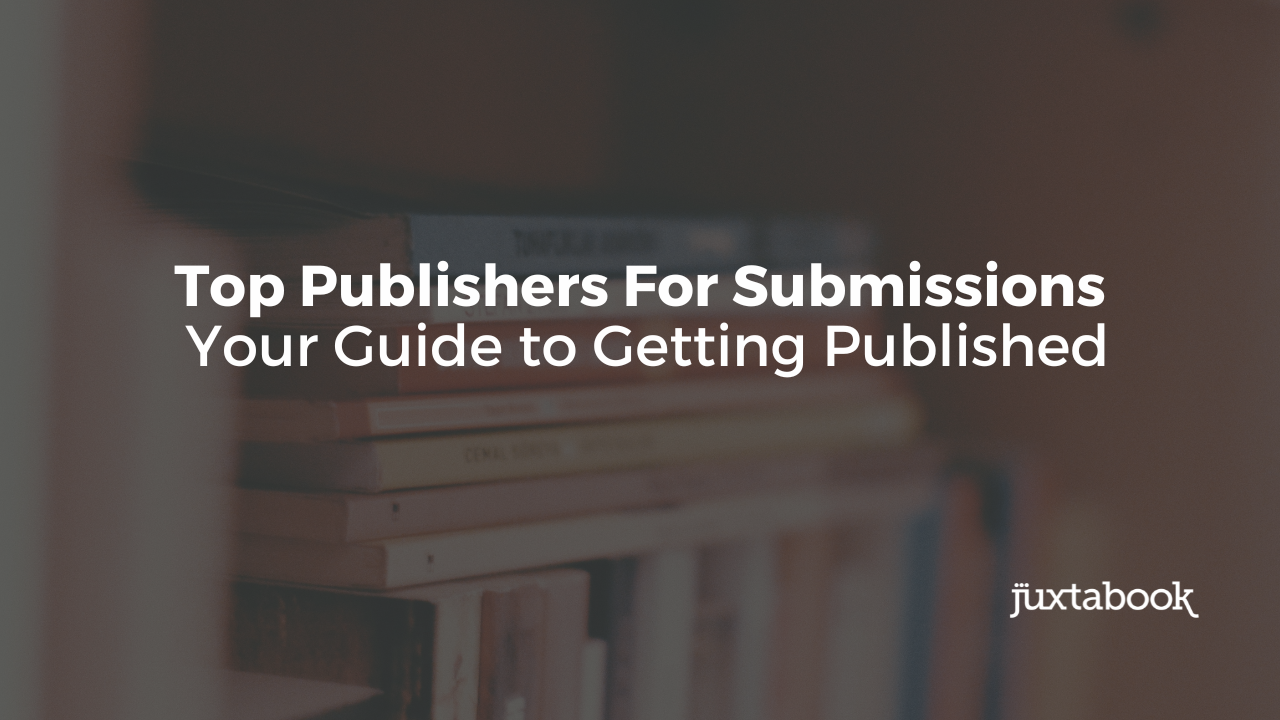Top Publishers For Submissions: Your Guide to Getting Published
Apr 03, 2025
Top Publishers to Consider for Your Next Book Submission in 2025
Looking to submit your manuscript in 2025? In this post we'll cover the some of the top options, including major publishers, indies, and academic research, and look at the business side of publishing. It's one thing to look at the options but you'll also want to find the right fit for your book and learn about their submission process.
Key Points
-
Big publishers like Penguin Random House, Simon & Schuster, and HarperCollins are open to unsolicited submissions, great for new authors in 2025.
-
Indies like Algonquin Books and New Directions offer opportunities for niche genres and innovative stories, worth considering.
-
Proper manuscript prep, including formatting and query letter, is key to getting published.
About the Publishing Industry
What do Book Publishers do?
Book publishers are the backbone of the traditional publishing industry, as well as distribution for hybrid and self-publishing. They do many things in the process, from editing and cover and interior design to printing and distribution.
Publishers contribute to some degree to marketing and sales, so books get to the target audience.
In addition to those logistical tasks, publishers offer editorial support so authors can meet the high standards of a traditional house.
With digital options available everywhere, book publishers now publish e-books and audiobooks to cater to reader preference. Adapting to reader’s means publishers will stay relevant and continue to be important in the literary world.
Leading Book Publishers Open to Submissions
If you truly want to pursue have your book go through a publishing house there are opportunities for new authors in 2025. Big publishers like Penguin Random House, Simon & Schuster, and HarperCollins are accepting unsolicited submissions directly from authors, depending on the imprint.
This is a good time for authors, as publishers can provide multiple pathways to publish your work without a literary agent.
Penguin Random House
As the largest US publisher, Penguin Random House has many genres and imprints for authors to research and submit to (potentially without an agent).
In 2025, their doors are open to submissions for multiple genres including historical fiction and mystery, a great opportunity for new authors to publish their stories.Simon & Schuster has many imprints for a wide range of fictional and non-fiction books. Authors should research the imprints and agents they’d like to submit to and include a query letter, synopsis and initial chapters of the manuscript for consideration.
As a publisher with broad interests in all types of literature including literary fiction, commercial titles and books to specific genres, Simon & Schuster is a flexible option for many authors looking to get published.
HarperCollins
HarperCollins is a top publisher and often 2nd in the top publisher rankings. HarperCollins business model also has many imprints to have a wide reach. As with the other big publishers, authors need to research the imprints and editors their book will fit with and may need the assistance of an agent.
Independent Publishers Worth Your Attention
Big houses are known for their size and distribution capabilities, yet independent publishers that specialize can attract authors who books will truly stand out by working with them.
Consider respected independent publishers like Algonquin Books, Soho Teen and New Directions when looking to find publishers dedicated to literary excellence in genres like mystery and introducing new perspectives.
Algonquin Books
Algonquin Books focuses on literary fiction and narrative nonfiction. They look for books on high quality storytelling that highlights the human condition. For authors who want to produce literature of high merit, Algonquin Books is a great option to explore.
Soho Teen
Soho Teen is YA and Children’s literature and seeks out authors who can create voices that appeal to their young audience.
They accept agents to submit works to maintain a diverse collection of narratives that engage young readers with their storytelling.
New Directions
New Directions focuses on non-traditional literary work. This independent small press is open to direct submissions from authors which means writers can work directly with acquisitions editors.
With their emphasis on groundbreaking literature, they’re an ideal platform for those who want to push the boundaries of conventional narrative forms.
Academic Publishers for Research and Scholarly Works
Academic publishers are for scholars and researchers to disseminate knowledge and drive progress in various academic fields.
Notable publishers like Wiley, Palgrave Macmillan and Open Book Publishers have specialized platforms for academic research and scholarly publications.
These big publishers have strict peer review systems and open access models, so their business model supports wide distribution and high impact of research work. This is what they bring to the table.
Wiley
Wiley stands out by having a vast array of both journals and books across many fields, so researchers can share their findings and apply what they’ve learned. This includes health, physical science, social sciences and humanities.
Palgrave Macmillan
Palgrave Macmillan specializes in social sciences and humanities with a foundation of books based on scholarly research. They have explicit submission guidelines for academic authors. By having these academic standards, Palgrave Macmillan upholds high scholarly excellence.
Open Book Publishers
Open Book Publishers is different by having an open access approach where readers can freely download scholarly works without cost. Unlike other publishers, they don’t charge Book Processing Charges (BPCs) to authors so appealing to researchers who want to widen the reach of their studies.
Researching Publishers
How to Find the Right Publisher for Your Book
Finding the right publisher for your book can be overwhelming but thorough research can increase your chances of success. Start by pinning down your genre and target audience. Look for publishers with a track record of publishing books like yours and review their submission guidelines to see if you need an agent or if they accept unsolicited manuscripts.
Online Resources
Online directories like Publishers Marketplace has a great (sometimes imperfect) database to research potential publishers and their contacts. You can find direct emails, addresses and phone numbers of acquisition editors. Even if you have this information you may not get a response if an agent is required.
Writing Conferences
Attending writing conferences and workshops is a great networking opportunity to learn from fellow authors and industry professionals. You can hear about others’ experience and what they wish they had known before working with a publishing house.
Evaluating Publishers
When evaluating publishers, consider their reputation, distribution channels and marketing support, if any. These will impact the success of your book in the competitive publishing world.
Preparing Your Manuscript for Submission
You will need to have your manuscript edited for submission especially if you’re publishing a fiction book. If you’re publishing a non-fiction book you don’t need the full manuscript but you should know how your book is different from everything else out there and there’s an audience who needs it.
When you’re ready to submit, focus on the details that will create an engaging query letter that gives an agent or publisher a clear idea of what your book is about.
Having it formatted and according to the guidelines will increase the chances of your work being accepted for publication.
Remember several key recommendations while getting your manuscript prepared for submission.
Formatting Guidelines
Make sure your proposal and manuscript is presented with proper formatting, use a clear readable font such as Times New Roman and double spacing between lines for the manuscript.
Proper formatting is not just about looks; it shows you understand the standards in the industry and you pay attention to detail. To avoid the risk of your manuscript being rejected be aware of the standard formatting practices but also adjust your submission to the guidelines of each individual publisher.
Writing a Compelling Query Letter
Your query letter is to grab attention and leave a lasting impression. It clearly communicates why your manuscript is unique while showing why there’s a market for it.
Highlight what sets your narrative apart and why it resonates with your audience.
Most agents will require a query letter before they want to see the full book proposal and consider taking your book on to pitch to publishers.
Common Mistakes to Avoid
One common mistake authors make is submitting queries before their manuscript is complete and polished. The exception is if you’re publishing a nonfiction book. Publishers and literary agents expect a finished product or a crystal clear idea for nonfiction books. If you have a fiction book make sure your manuscript is ready for review.
Try to avoid typos and formatting errors. A few minor errors won’t stop an agent or publisher from reviewing your book but too many may create a negative impression.
The Publishing Process
The publishing industry is old and new and has changed a lot in the past thirty years. To navigate this landscape you need to understand the different publishing options available, traditional, indie publishing and hybrid models.
Traditional Publishing
Traditional publishers offer full service from editing to distribution to some marketing support. But they often require authors to find a literary agent before submitting their manuscript and book proposal.
Indie Publishing
Indie publishers provide more flexibility and creative control while having some of the same services as traditional publishers but at a cost.
Hybrid Publishers
Hybrid publishers blend elements of both traditional and indie models, offering services while authors have control over their work, full rights to their book and full royalty from each book sale.
By understanding these different publishing options and how they work and the trade-offs authors can make informed decisions about their publishing journey.
Utilizing Literary Agents
Literary agents offer valuable support and industry knowledge as you enter the publication process. They act as intermediaries between writers and publishing houses and advise authors on how to position their book, pitch their book proposal and help authors sign with publishers who will take on the responsibility of managing their book’s production and distribution.
They advise authors on how to submit effectively, negotiate contractual terms and are skilled at getting more favorable agreements for those they represent.
To get the most out of their knowledge and skills here’s some advice on how to use an agent’s expertise.
Finding the Right Agent
Finding the right agent involves targeting those who specialize in your genre and have a track record of selling books like yours. A successful query letter should include relevant credentials and a brief summary of your plot.
Research agents who have sold books like yours to increase your chances of success.
Benefits of Having an Agent
Having an agent will get you in the door to editors and publishing houses you wouldn’t be able to connect with otherwise. Agents have the knowledge and networks that may increase your opportunities of finding a publishing house who makes an offer.
They will guide you through every stage of the process from manuscript submission to publication, making sure your interests are advocated for.
Agent Resources
Authors have resources to help them find a reputable agent. Writer’s Market has a list of agents open to certain genres and their submission guidelines.
Using these resources will make your search for the right agent less time consuming and increase the chances of finding a match for your work.
Online Resources
Below are some online assets available to authors.
Reedsy Marketplace
Reedsy Marketplace gives authors access to a network of over 3,500 experts in editing, graphic design and marketing. It’s a one-stop shop where authors can partner with professionals to elevate their work and increase their chances of publication.
Free Online Materials
Authors have access to a huge amount of online resources including formatting templates, book and query submission trackers and online courses.
These tools will simplify the manuscript submission process and help authors showcase their work according to the industry standards and each publisher.
Using these resources authors can save time and reduce the stress that comes with preparing a manuscript for submission.
Author Communities
Communities of authors like the Juxtabook Author Community offer opportunities for networking and support from fellow authors. These platforms allow writers to share their experiences, ask for guidance and support each other throughout the writing and publishing journey.
Conclusion
Entering the publishing world can be daunting but it’s something you can learn and thrive. Authors now have more opportunities to get published thanks to a better understanding of both traditional and indie publishers and the publishing industry.
Remember following submission guidelines, refining your manuscripts before submitting and getting support when needed are key steps along the way. The path to seeing your work in print is open to those who pursue it thoughtfully.
FAQs
Who is the publisher of a website?
The publisher of a website is usually the author of the content or the organisation behind it which you can usually find at the bottom of the page or in the post itself.
Just check the footer or the byline for clarity!
Do publishers pay for your book?
No, publishers don’t pay you directly for your book; they pay you royalties based on your book sales.
So, the more your book sells the more you earn!
What are the benefits of submitting directly to major publishers?
Submitting directly to major publishers will get your book more visibility due to their resources and established marketing networks so increase the chances of success.
Good strategy to get your writing in front of a wider audience!
How do I find an agent for my genre?
Best way to find an agent for your genre is to research agents who specialise in it using tools like Writer’s Market and QueryTracker.
This will help you find those with a track record of sales in your area of writing.
What should I include in my query letter?
A good query letter should have brief summary of your manuscript, showcase your unique voice, mention any relevant credentials and explain why your book will appeal to readers.
Stuck Knowing How to Publish Your Book?
Take the quiz to Discover the Ideal Book Publishing Path for You






